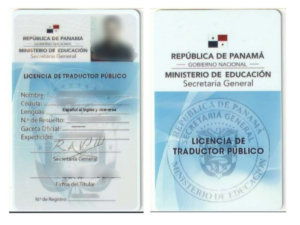Under Law No. 8 of March 30, 1982, which governs Panama’s maritime courts, certified interpreters are specifically required in cases where documents are not in Spanish or when individuals involved in the proceedings do not speak Spanish. These provisions ensure that all evidence and testimonies presented in court are accessible and legally valid.
When Are Certified Interpreters Required?
The law outlines specific instances where a certified interpreter is necessary:
- Non-Spanish Documents
- Article 224: Testimonies or expert reports submitted in a language other than Spanish must include a translation into Spanish, completed by a certified public interpreter in Panama.
- Articles 329 and 330: Foreign documents, such as contracts or official records, must be accompanied by certified translations to be accepted as evidence. If a public interpreter is unavailable, an ad hoc interpreter appointed by the court may fulfill this role.
- Non-Spanish-Speaking Individuals
- Article 371: When a person who does not understand Spanish must testify, the court is obligated to appoint a certified interpreter to facilitate communication. This requirement ensures the witness’s statements are accurately conveyed and understood during the proceedings.
Why Is Certification Necessary?
The certification of an interpreter is crucial because it ensures that the professional has the necessary training and skills to translate accurately and faithfully. Their role is essential for:
- Ensuring the accuracy of testimony and evidence translation.
- Preventing misinterpretations that could compromise the validity of documents or testimonies presented in legal proceedings.
- Upholding fairness and equity in judicial processes by ensuring that non-Spanish speakers are properly represented.

Limitations on the Requirement
It is essential to note that certified interpreters are not universally required for all cases. They are specifically needed only when:
- Evidence or documents are not originally written in Spanish.
- A witness, expert, or party involved in the proceedings does not speak Spanish.
For proceedings conducted entirely in Spanish or involving Spanish-language documents, the services of a certified interpreter are not mandated by law.
Ensuring Compliance with the Law
To comply with Law No. 8, parties involved in maritime court cases should:
- Verify Language Needs: Determine whether any evidence or testimony will be in a language other than Spanish.
- Engage Certified Interpreters Early: If needed, arrange for certified interpretation services to avoid delays or challenges in court.
- Confirm Interpreter Credentials: Ensure the interpreter is licensed as a public interpreter in Panama or has been properly appointed by the court.
Conclusion
Law No. 8 ensures that Panama’s maritime courts maintain clear and accurate communication by mandating certified interpreters only in cases involving non-Spanish documents or participants who do not speak Spanish. This targeted requirement helps facilitate fair and efficient judicial proceedings while respecting the linguistic diversity inherent in international maritime cases.
For expert assistance in certified interpretation and legal translation services, contact us to ensure your case meets all procedural requirements.
If you need to hire a certified interpreter in Panama, please call us at +507 6290-3468 or send us an email at info@certifiedtranslatorpanama.com.

